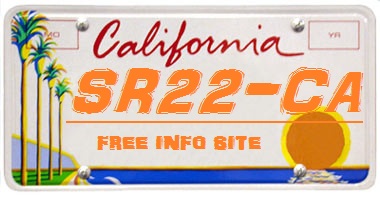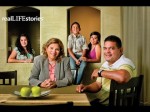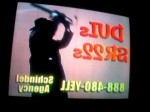When the verdict was announced, his sister shrieked. She sent a tweet to her 125,000 followers saying “VICTORY,” and ended it with seven exclamation marks. His fans waved their banners praising Jesus, and screamed, and wept, and blew horns. People said, while crying in front of cameras, that there had, at long last, been what their banners had demanded: “Justice for Michael!” His mother agreed. “I feel,” she told reporters, “better now.” Everyone seemed to. Everyone — apart, perhaps, from Conrad Murray, and his defense lawyers, and maybe some of the women who claimed to be his girlfriend, and maybe some of the mothers of some of his children — seemed to feel an awful lot better now. They seemed to think that although nothing could bring back the man they claimed to love so much, this was a very, very happy day. They seemed to feel like Michael Jackson’s mother, who couldn’t wait “to go home and share this day” with his children, and “couldn’t hold back tears of joy.” Everyone seemed to think that what had been a tragedy wasn’t any more. Because a man who was paid nearly £100,000 a month to give him the kind of drugs you can’t just pick up at Boots, had given him an awful lot of the kind of drugs you can’t pick up at Boots, and been so careless about it that he’d been chatting on the phone to a cocktail waitress while the man he was meant to be looking after was having a bad reaction to a drug you definitely can’t pick up at Boots, had been found guilty of killing him by accident. Or it wasn’t as much of a tragedy as it had been, because the person who caused it had been found and would be punished. Perhaps when these people heard that the most successful pop star in world history, who was not only a brilliant singer and songwriter, but also did some of the most athletic and original dancing ever done by a rock star, and who cared so much about his appearance that he made improving it into a life’s quest, was crippled with arthritis, and nearly blind, and had a toenail fungus so bad that doctors thought his flesh was rotting away, they thought this was a normal thing for a 50-year-old man. Maybe when they heard a recording of his voice, which was so weak and slurred that you could hardly make out the words, but which had sounded pretty good on the albums that almost everyone in the Western world had bought, they thought this was normal, too. And maybe not a single one of these people wondered what on earth had happened to his family, and the people he called his friends. Perhaps they thought it was normal to watch your brother, or son, or friend, have so many operations on his face that some people said some of the bones in it were in danger of collapsing, and that what you should say, when he came out of hospital from the latest one, was that he definitely looked better than before. Maybe they thought, when they heard he was paying someone nearly £100,000 a month, to give him drugs almost every doctor in the world would say he didn’t need, that this sounded like excellent value. And maybe when they heard another recording of the pop star in court, telling that doctor that he wanted to use the proceeds of the tour he was planning to help sick children, because he himself “didn’t have a childhood,” they just shrugged and thought “so what?” Maybe they thought that it didn’t really matter whether you had a childhood. That a childhood was a small thing to give up to produce the kind of music that the King of Pop produced, and a small price to pay for the fame he had. It isn’t all that easy to know what Michael Jackson’s family, friends and fans thought about any of these things, because, when they talk about him, they tend to talk as if he wasn’t a human being, but a god. His sister, La Toya, said on Monday that “victory was served” because her brother was, though technically dead, “in that courtroom.” She didn’t say what, if anything, she’d done when she’d watched her brother being flogged by their father for making mistakes in rehearsals throughout his childhood, and from the start of his singing career at the age of six. Nor did his mother. And nor, of course, did his father, who used, according to his son, to watch his sons rehearsing with a belt in his hand, and often told him that his nose was “too fat.” You’d have thought that sisters, and brothers, and parents, and friends, might think it wasn’t usually a good sign when someone built themselves a giant fun fair, and zoo, and named it after a fantasy land in a children’s book about a boy who never grows up. And that they might be a little bit worried when their best friends seemed to be prepubescent boys and a chimpanzee called Bubbles. But sisters, and brothers, and parents, and friends, didn’t seem too worried by any of this, or, if they were, they didn’t say so. They seemed to think that nothing could be strange in the life, and lifestyle, of someone who was very, very talented, and very, very successful, and very, very, very rich. They seemed to think that someone who was very talented, and very successful, and very rich should always do exactly what they wanted, even if what they wanted was to wreck their once-handsome face and body with plastic surgery and drugs. Michael Jackson called the drug that killed him “milk.” He never stopped seeking the props of the childhood he had lost. Perhaps when he looked at photos of that brown-skinned boy, with his big nose, big lips, and big smile, he saw a shadow of the person he once was, the person he’d paid doctors to wipe out. Perhaps he remembered a time before his life became a giant freak show. “Wasn’t nothing strange about your daddy,” Al Sharpton told Jackson’s children at his funeral. That, of course, was a lie, but what he said next was true. “It was strange,” he said, “what your daddy had to deal with. But he dealt with it anyway.” Yes, he dealt with it anyway: the parents who cared more about money and fame than that their son had a childhood, the brothers and sisters who were nearly as damaged as him, the people who said they were friends, but who only seemed to want to be sprinkled with his star dust, and the people — so many people — who just wanted his money. And a press poised for every new twist in the crazy carnival his life became. It was Conrad Murray’s defense lawyer who reminded jurors that “this is not a reality show, it’s reality.” Unfortunately, no one in Jackson’s sad, strange and shockingly friendless life, seemed to know the difference. Originally posted here: Christina Patterson: It Wasn’t Just One Man Who Killed the King of Pop
Posts Tagged ‘ money ’
Listage : Atwater Crossing Kitchen Rolls Out Dinner Service; Five Best Ice Cream Shops in LA
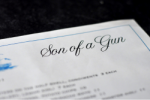
Son of a Gun, Mid-City. [Photo: cathydanh / Eater LA Flickr Pool ] · County Re-Ups Starbucks Deal for Civic Center Park [blogdowntown] · Atwater Crossing Kitchen Rolls Out Dinner Service [LAT] · American Chefs Discover Mustard Oil [NYT] · How Groupon Turned Into a Messy Orgy of Money, Sex, and Ego [Gawker] · Seaweed Skirts in Berlin Fashion Food Show [AFP] · 5 Best Ice Cream Shops in Los Angeles [LAW] · Jim Meehan’s PDT Cocktail Book [-EN-] Read the original here: Listage : Atwater Crossing Kitchen Rolls Out Dinner Service; Five Best Ice Cream Shops in LA
Detectives Seeking Help to Identify Robbery Suspect
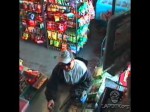
Detectives Seeking Help to Identify Robbery Suspect Los Angeles: Detectives released a video that captured the robbery of a neighborhood mini market. The suspect produced sawed off shotgun, pointed at the cashier and demanded money. On August 12, 2011 at 1655 hours, the suspect entered a mini market located in the 5900 block of South San Pedro Street. The suspect told the cashier in Spanish that he was embarrassed but needed the money. The suspect immediately pulled a sawed off shotgun from his left jacket sleeve. The suspect demanded money and pointed the shotgun at the cashier. The cashier in fear for her life opened the cash register and handed the money to the suspect. The suspect took the money and walked out of the mini market. The suspect is described as a male Hispanic, 5′ 05″-5′ 07″, 190/210 pounds and 30-35 years of age. Anyone with information regarding this case is asked to call Newton Area Robbery Detective Medina at 323-846-6572. After hours or on weekends, calls may be directed to a 24-hour, toll-free number at 1-877-LAPD-24-7 or by texting CRIMES (274637) and beginning the message with the letters LAPD. Tipsters may also submit information on the LAPD website, www.lapdonline.org. All tips will remain anonymous.
7-Eleven Robbery Suspect Captured on Video; Suspect Being Sought NR11411gb

Los Angeles: LAPD West Los Angeles Division detectives are asking for the public’s help in providing any information that will lead to the arrest of a suspect who robbed a convenience store in West Los Angeles area. On September 1, 2011, around 2:15 am, an African-American male entered the “7 Eleven” located in the 11650 block of Wilshire Boulevard. Once he is inside the store, he pointed a handgun at two customers standing to the rear of the store. The suspect ordered the customers to the ground. The suspect proceeded to point the handgun at an employee behind the counter and demanded money from a cash register. The suspect gave the employee a blue bag (possible pillowcase) to put the money in. Once the suspect’s demands were met, he ran from the store in an unknown direction with an undisclosed amount of money in the blue bag. The “7 Eleven” was equipped with a CCTV (Closed Circuit Television) system that captured the robbery on video. The suspect is described as an African-American male that appeared to be 20-25 years of age. He stands about 5 feet 7 inches tall and weighs about 150 pounds. The suspect was last seen wearing a black and gray hooded sweatshirt, black jeans, black gloves and black ski mask. The suspect is to be considered ARMED and DANGEROUS! Anyone with information on this crime is urged to call West Los Angeles Area Robbery Detectives at 310-444-1520. During non-business hours or on weekends, calls should be directed to 1-877-LAPD-24-7 (1-877-527-3247 …
Unconstitutional DUI / Driver’s License Checkpoint Santa Maria, California 9/10/10
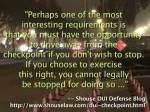
SANTA MARIA, California — Santa Maria Police Department conducted yet another unconstitutional and illegal DUI / Driver’s license checkpoint as part of California Office of Traffic Safety’s (OTS) “Year of the Checkpoint” campaign for 2010. The Santa Maria checkpoint was only one of more than 2500 (ostensibly) OTS-funded checkpoints which are due to be carried out within the state of California during 2010. (Following the money trail, the funding actually traces back to the National Highway Traffic Safety Administration (NHTSA), which is an agency under the federal Department of Transportation (DOT), which is a cabinet position under the President of the United States.) If OTS’s “Year of the Checkpoint” campaign is successfully carried out, then California drivers will endure more than 208 of these unconstitutional / illegal checkpoints per month. “To my knowledge, California conducts more checkpoints than any other state,” said OTS Director Christopher J. Murphy. While DUI checkpoints were officially (if unconstitutionally) sanctioned by the Supreme Court’s Michigan vs. Sitz case, driver’s license checkpoints were not. However, a quick survey of police department websites reveals that most DUI / sobriety checkpoints are dual purpose; that is, police officers regularly check for driver’s licenses in addition to checking for driver impairment. Even though driver’s license checkpoints are not legal according to case law, most drivers are unaware of this fact and so the …

